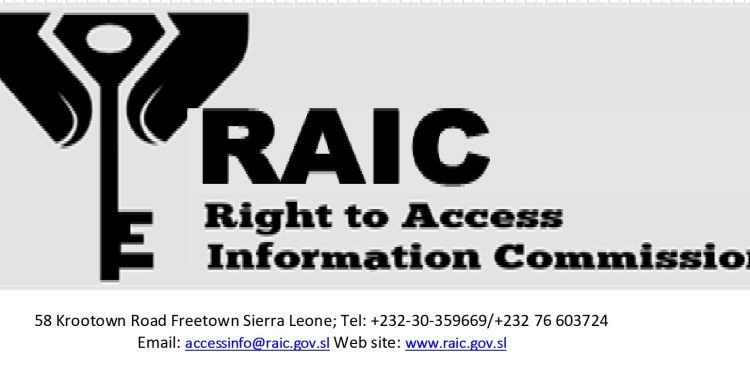Press Release 19th May 2025
The Right to Access Information Commission (RAIC) engaged public authorities, civil society organizations and the media on digital access to information and compliance with proactive and reactive information disclosures from Wednesday, 14th May, 2025, to Friday, 16th May, 2025, in Makeni, Bo and Kenema respectively.
The three-day awareness raising engagement in the regions is part of the Commission’s popularization efforts to raise awareness on its new digital infrastructure designed to digitalize and expedite access to information and also to enhance compliance with reactive and proactive information disclosures as provided for by the Right to Access Information Act of 2013 (RAI Act 2013) and RAI Regulations 2022.
In all the engagements and awareness raising in Makeni, Bo and Kenema, RAIC’s Chairman and Information Commissioner, Dr. Ibrahim Seaga Shaw, highlighted key successes of the Commission, referencing the 19,426 freedom of information (FOI) requests recorded nationwide in 2023 and similar statistics being analyzed for 2024, saying the Commission uses a two-prong approach: babysitting or carrot approach which focuses on engaging and empowering public authorities to comply with the access to information law; and the stick approach which penalizes defaulters for non-compliance.
According to Dr. Ibrahim Seaga Shaw, the digital platform, which the Commission has developed, has all the Freedom of Information Forms uploaded into the Commission`s website [www.raic.gov.sl], adding that the consultant or developer is at an advanced stage to improve the digital infrastructure.
“In this digital era, access to information is not a privilege—it is a fundamental right. Our goal is to ensure that public institutions are compliant in principle and effective in practice when it comes to proactive and digital disclosure,” he stated. While urging the participants to collaborate in efforts to accomplish the main goal of improved service delivery, he further quoted the ‘Ubuntu’ principle, an African proverb which means: “we are because you are” as reference that the commission was established because of these stakeholders.
Dr. Shaw also took participants through the Proactive Disclosure of Information (PDI) and Annual Compliance Report (ACR) templates – how to complete them and the rationale behind the two documents. He urged public authorities, civil society and the media to support the implementation of the law, emphasizing that the Commission is primarily mandated by law to facilitate access to information in the country.
He said that all public authorities should provide access to the information they hold, and reiterated that they are just holders but members of the public are custodians of the information. He continued that article 19 of the Universal Declaration of Human Rights provides that every persons have the right to seek, receive and impact information without borders and that is one of the legal foundations of the RAI Act 2013.
He noted that, in addition to making request for information by using paper or verbally, there is now an additional option of going on the commission’s website and complete the request forms, that is Form A (Request for information form), Form B (Acknowledgement Form), which the public authorities complete after request, Form C (Response Form) and Form D (Complaint Form). He told them that making information request is not just for ordinary people but public authorities can also request for information.
He added that Section 41 of the RAI Act makes it very clear that the Commission should provide an annual report every year highlighting the operations of the Commission, status of compliance from public authorities. He however pointed out that the Commission can do that effectively with the supports of stakeholders.
“All ministries, departments and agencies are now going to be evaluated on access to information, failure to comply, not only RAIC will come after you but you will also be answerable to parliament,” he said. He discussed the evaluation sheet with the participants.
He urged participants to serve as ambassadors to take the message to their various institutions and to the public as they represent their institutions as well as to other MDAs that were not present.
One of the participants in the engagement in Bo, Mr. Alusine Bangura, Information, Education and Communications Officer of Bo District Council raised the need for regional archives for proper records management for public authorities.
Another participant, Mr. Mohamed Alieu Koroma, the Information, Education and Communications Officer of Bo City Council, said the delay in completing the PDI and ACR was as a result of transfers made in most government offices.
Also, Mr. Charles K. Lamin of the Ministry of Local Government applauded the effort of the Commission in implementing digital access to information and the good work of the regional offices.
The event brought together representatives from key public institutions, media, and civil society to enhance their understanding and use of digital platforms in promoting transparency, accountability, and proactive information disclosure.
The training was part of RAIC’s national effort to strengthen institutional capacity in compliance with the Right to Access Information Act of 2013, with a strong focus on bridging the digital divide in public sector communication.
A key outcome of the workshop was the collective commitment of all participating institutions to fully comply with the Annual Compliance Report distributed during the session. Additionally, RAIC announced its strategic plan to establish a regional office in the North-West Region, extending its reach and oversight across the country.
The Commission expresses its sincere appreciation to all stakeholders for their active participation and pledges continued support to ensure effective implementation of access to information laws through digital innovation.
Reported by:
John Kalokoh – PPICO – North
Millicent Brima – PICO – South
James Fortune – PICO – East
Compiled by: Amara Thoronka – PICO National Secretariat











